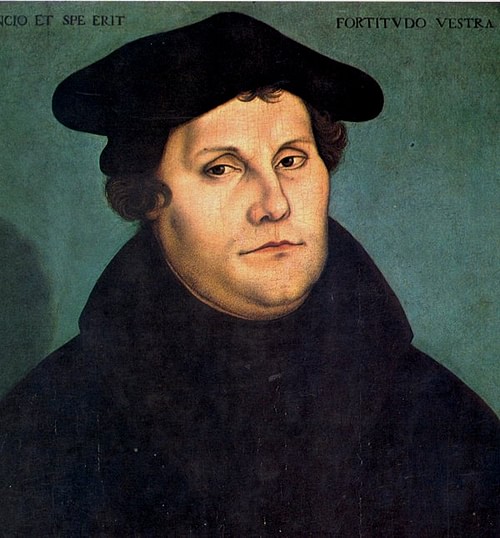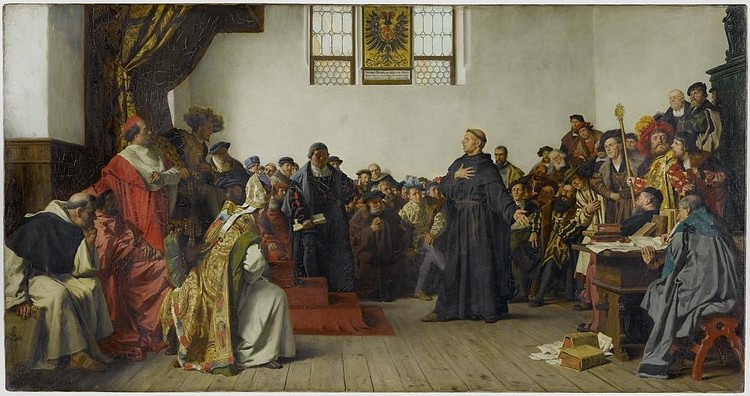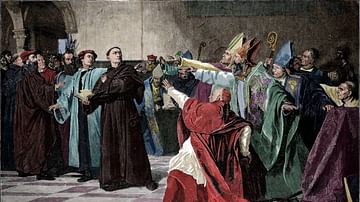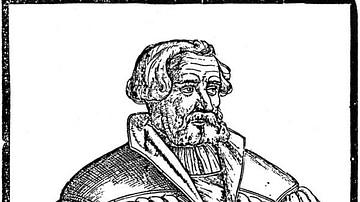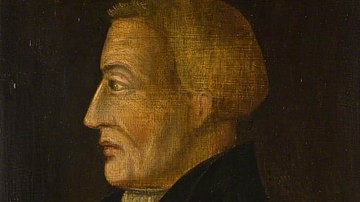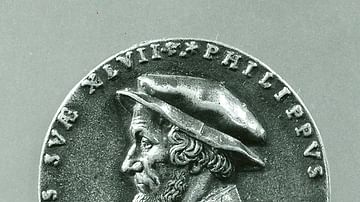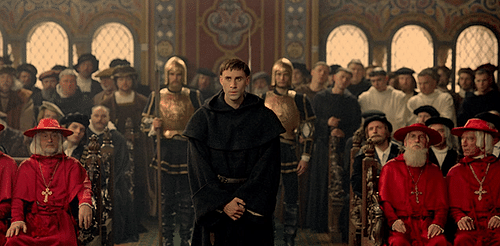
The Diet of Worms (January-May 1521) was the assembly convened by Charles V, Holy Roman Emperor to address, among other issues, the works of the reformer Martin Luther (l. 1483-1546) who openly criticized the Church. Luther was told to recant and, when he would not, was charged with heresy, marking his official break with the Church.
Luther first attracted the attention of ecclesiastical authorities after the publication of his 95 Theses (written 1517) in 1518. Luther continued to preach, write, and publish his attacks on the Church, was excommunicated in January 1521, and told to appear before the assembly at the city of Worms (pronounced Verms). Luther obeyed the summons, under a promise of safe conduct issued by Frederick III (the Wise, l. 1463-1525) of Saxony, and appeared in April. He refused to recant and was charged as a "notorious heretic" and outlaw, making him a criminal.
He would have almost certainly been killed after leaving Worms but was apprehended by the soldiers of Frederick III and brought to his castle at Wartburg for his protection. Here, Luther would write a number of influential pieces as well as translate the New Testament from Latin to German. The Diet of Worms, therefore, is generally regarded as the pivotal event marking Luther's emergence as a Christian reformer operating outside the authority of the Church and establishing the central platform of the Protestant Reformation in Europe.
Martin Luther's 95 Theses
Martin Luther began questioning the precepts of the Church, privately, c. 1513 when he resolved a spiritual crisis he was suffering after reading Saint Paul's Epistle to the Romans. The passage from Romans 1:17, which includes the line "the just shall live by faith", led to his conviction that many of the policies mandated by the medieval Church were unbiblical as they needlessly imposed on believers burdens unsupported by scripture. In time, Luther would question the entire vision, hierarchy, and authority of the Church, but, at first, his objections focused on the sale of indulgences.
Indulgences were writs purchased for the remission of sins for the living or for the dead suffering torments for their sins in purgatory. The sale of indulgences was nothing new in Luther's time, but formerly, they were issued with the understanding that the recipient would perform penitential acts. By the time of the English proto-reformers John Wycliffe (l. 1330-1384) and the Bohemian Jan Hus (l. c. 1369-1415), indulgences were frequently offered without this stipulation. All one had to do was pay a certain amount of money to receive a writ that pardoned one's sins while living or shortened the stay of a loved one in purgatory.
Many states throughout the Holy Roman Empire (which modern-day Germany was part of at this time) prohibited the sale of indulgences, but in 1516, the archbishop of Mainz, Albrecht von Brandenburg, received dispensation from Pope Leo X to allow indulgences in his region. Albrecht had borrowed large sums of money to buy his ecclesiastical position and needed a large influx of cash to pay his debts while Pope Leo X needed money to rebuild Saint Peter's Basilica in Rome. They agreed they would evenly split the money from the sale of indulgences between them, and the Dominican friar and salesman Johann Tetzel was sent to the area in 1516.
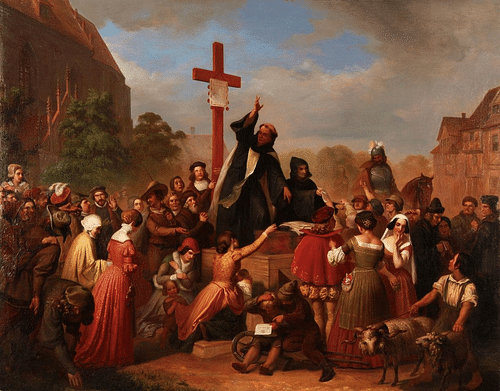
Luther wrote out his objections to the sale of indulgences in his famous 95 Theses which, according to the traditional account, he posted on the door of the church at Wittenberg, where he was a professor at the nearby university. The 95 Theses were simply academic disputations, which presented the subject for debate by clergy, and were sent to Albrecht von Brandenburg by Luther, who knew nothing of the deal Albrecht had with the pope, in fall 1517. Luther's friends and supporters translated the theses from Latin to German and published them, and these copies were then translated into other languages and spread to Britain, France, Italy, and elsewhere, inspiring others to question the authority of the Church.
Augsburg, Leipzig, & Excommunication
Among the disputations of the 95 Theses is number 82 – "Why does not the pope empty purgatory, for the sake of holy love and of the dire need of the souls that are there, if he redeems an infinite number of souls for the sake of miserable money with which to build a Church?" – and 83 – "Why are mortuary and anniversary masses for the dead continued, and why does he not return or permit the withdrawal of the endowments founded on their behalf, since it is wrong to pray for the redeemed?" These two objections, along with others throughout, directly challenged the pope's authority and the Church's policies.
Albrecht von Brandenburg sent the 95 Theses to Rome after examining them for heretical content, and the pope ordered Luther to appear and explain himself. Frederick III, however, managed to arrange to have Luther appear in Augsburg and a papal legate sent to examine him before the Imperial Diet there in October 1518. Cardinal Cajetan was sent with instructions to arrest Luther if he would not recant, and the two argued over the 95 Theses for three days during which Cajetan tried to force Luther's submission and Luther stood his ground.
As the examination was reaching its end, Cajetan reminded Luther that his arguments echoed earlier heretics like Wycliffe and Hus who insisted on the primacy of individual interpretation of scripture in defiance of the traditions of the Church. Scholar Roland H. Bainton describes the scene:
The cardinal reminded Luther that Scripture has itself to be interpreted. The pope is the interpreter. The pope is above a council, above everything in the church. "His Holiness abuses Scripture," retorted Luther. "I deny that he is above Scripture." The cardinal flared up and bellowed that Luther should leave and never come back unless he was ready to say, "I recant." (84)
Luther left the room and later wrote to supporters that "the cardinal was no more fitted to handle the case than an ass to play on a harp" (Bainton, 84). This image was later taken up by his friends who published pamphlets depicting the pope as an ass in their attacks on the Church and attributing the comparison to Luther. Cajetan never made a move to arrest Luther during the examination, although he no doubt would have wanted to, and Luther was helped to escape from Augsburg by his supporters before Cajetan had another chance.
In June 1519, the theologian Johann Eck (l. 1486-1543), a former friend of Luther's, arranged a debate with Luther's co-reformer Andreas Karlstadt (l. 1486-1541) at Leipzig. Luther attended the event and again maintained that the pope was not above scripture and had no authority over souls in purgatory whose state of sin could not be known by the living. Eck charged Luther with heresy, comparing him to Jan Hus who, at this time, was regarded as a heretic by the Church and had been burned at the stake in 1415. Eck pointed out that Luther, like Hus, was insisting he knew better than the pope or Church councils on interpreting scripture and accused him of the sin of pride in thinking he was the only one who knew anything. Luther replied:
I will tell you straight what I think. I am a Christian theologian; and I am bound, not only to assert, but to defend, the truth with my blood and death. I want to believe freely and be a slave to the authority of no one, whether council, university, or pope. I will confidently confess what appears to me to be true, whether it has been asserted by a Catholic or a heretic, whether it has been approved or reproved by a council. (Bainton, 109)
The debate ended with both sides claiming victory and continued their arguments in a pamphlet war – including the image of the pope as an ass playing bagpipes – as Eck continued his charges of heresy and Luther condemned the pope and Church as anti-Christ.
Pope Leo X, upon hearing more about this troublesome German professor in June 1520, threatened Luther with a papal bull of excommunication unless he recanted. Luther burned the papal bull publicly in December 1520 and was excommunicated in January 1521. Luther was now understood as outside the grace of God and His Church, and his case was turned over to the secular authorities who summoned him to appear at the Diet of Worms.
Diet of Worms
Although Luther had been excommunicated, it was still possible for him to be welcomed back into the Church as a member in good standing – if he would recant. By this time, however, even if had wanted to, a recantation would have lost him all credibility as a Christian theologian and minister of the gospel. His 95 Theses had captured the imagination of the people, and his refusal to submit to the authority of the Church made him a popular hero. The papal nuncio, Aleander, who was put in charge of organizing Luther's examination at Worms, wrote to Rome:
Martin is pictured [in pamphlets] with a halo and a dove above his head. The people kiss these pictures. Such a quantity have been sold that I was not able to obtain one. [Another pamphlet depicts] John Hus, whom Luther has recently proclaimed his saint. In another part of the picture the pope and the cardinals are being bound by the soldiers of the guard. I cannot go out on the streets but the Germans put their hands to their swords and gnash their teeth at me. (Bainton, 171)
The wealthy landowners supported Luther because they saw in him the hope of breaking the Church's power, which extended to tax-free landownership and direct intrusion upon successions and alliances. The peasantry loved Luther for his challenge to the status quo that kept them in poverty. Luther's supporters made full use of the printing press in depicting him as a second Christ come to redeem the true teachings of Jesus from the corruption of the Catholic Church, and Luther, an expert showman, encouraged this image, arriving in Worms in April like Jesus Christ entering Jerusalem on Palm Sunday:
When he arrived at Worms on April 16, two thousand people thronged the streets trying to get a look at him. The papal nuncio Aleander noted that, as Luther climbed down from the wagon, a monk stepped forward to embrace him and then touched his cassock three times as if he were a saint. (Roper, 168)
On 17 April, he was examined by one Johann Eck (not the same theologian at Leipzig), who asked him whether he would recant his works. The examination had been carefully designed to deny Luther the opportunity to speak as he was recognized as a powerful orator. The questions were phrased to allow him only yes-or-no answers. Luther got around this by noting that his books contained many different themes and addressed a variety of issues and he could not simply say "yes" or "no" to the questions regarding all of them. He asked for and was given an adjournment.
The next day, when he was expected to either take responsibility for his works or recant, Luther noted how even his enemies respected many of his works on theology, so he would not revoke those, and his other works were honest refutations of papal authority based on scripture, and he could not, in good conscience, revoke those either. Luther's speech at the Diet of Worms concluded with the following lines:
Unless I am convinced by the Scriptures of by clear reason (for I do not trust either in the Pope or in the councils alone, since it is well known that they have often erred and contradicted themselves), I am bound by the Scriptures I have quoted and my conscience is captive to the Word of God. I cannot and will not retract anything, since it is neither safe nor right to go against conscience…I cannot do otherwise, here I stand, may God help me. Amen. (Roper, 172)
After his concluding line, he is said to have raised his arm in the salute of a medieval knight who has just soundly won a bout.
Edict of Worms
Charles V personally responded to Luther's attacks in a letter written that same night:
"Our ancestors, who were also Christian princes, were nevertheless obedient to the Roman Church which Dr. Martin now attacks." It hardly seemed likely that one monk could be right and centuries of learned theologians could be wrong. He concluded that Luther and his adherents must therefore be excommunicated and "eradicated". It was a clear decision for the Church and for tradition. For the imperial side, the issue at stake was who had the authority to interpret Scripture. (Roper, 175)
Luther's safe-conduct pass, granted him by Frederick III, was still in effect and respected and so Luther passed a few more days in Worms while he awaited a response and then left to return to Wittenberg around 26 April. Some of the nobles and clergy at Worms counseled Charles V to revoke the safe conduct, have Luther arrested, and execute him – just as authorities had done with Jan Hus at the Council of Constance in 1415 – but Charles V refused as it would dishonor him.
On 25 May 1521, after over a month of private conferences and arguments about Luther's fate, the Edict of Worms was issued declaring him a heretic and an outlaw. He was to be arrested and a reward was offered for anyone assisting in his capture; anyone caught helping him in any way would be charged with crimes against the state.
By this time, however, Luther had been long gone and, further, never appeared as expected back in Wittenberg. He had been abducted, en route, by soldiers of Frederick III, on his orders, in the guise of highwaymen. As far as those who were traveling with Luther knew (save one) he had actually been taken by bandits, but Frederick III had him brought to his castle at Wartburg for safety.
Conclusion
Luther's dramatic defiance at the Diet of Worms ended any hope of reconciliation with the Church and elevated him to the status of a saint among the peasantry. Shortly after the edict was issued, a pamphlet appeared depicting the event in the phrasing of the biblical narrative of Christ's Passion, with Charles V in the role of Pontius Pilate and the Catholic officials as the high priests demanding Christ's crucifixion; Luther, of course, was cast in the role of Christ himself.
No one knew what had happened to Luther after he left Worms, and Frederick III was careful that no one find out. In his time at Wartburg Castle, Luther wrote a number of notable tracts, which were smuggled out and published, so people knew he was alive, just not where he was writing from. By the time he left Wartburg and returned to Wittenberg, the German Peasants' War (1524-1525) had begun – partly inspired by Luther's stand at Worms – and the edict could not be enforced. Luther was too popular a figure to risk arresting, and although some of his supporters were taken and executed in neighboring states, no attempt was made to enforce the Edict of Worms in Germany.
Luther's appearance at the Diet of Worms contrasts starkly with that of Jan Hus at the Council of Constance over a hundred years before. Like Luther, Hus also had devoted supporters, had been given a promise of safe conduct, and, initially, had the support of both peasants and nobles. Luther, however, had a powerful weapon Hus lacked simply because the technology was not available in 1415: the printing press.
The press was not invented until c. 1440, and there were many in operation throughout Germany by the time Luther wrote his 95 Theses. Luther's skill in manipulating public opinion through words and images made all the difference between his moment at Worms and Hus' at Constance. Luther was a skillful writer and orator, well-versed in scripture, and confident of his conclusions, but the same was true of Hus. Luther, and his followers, brilliantly avoided the fate of Hus by casting him as a Christ-like figure and man of the people, repeatedly, through pamphlets and tracts in German and so transformed the monk from Wittenberg into the hero of Christianity and victor of the great bout at the Diet of Worms.
